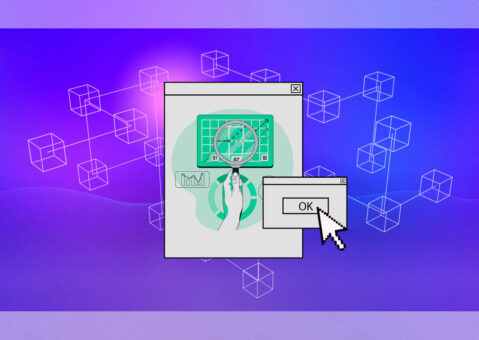DAO-Analyzer is a web tool to monitor the activity of Decentralized Autonomous Organizations (DAOs). It was created within the umbrella of two research projects: Chain Community and P2P Models.
In the last few years, DAOs have emerged as a new form of collective governance in which communities can organize themselves relying on decentralized applications in the blockchain. These applications mediate the interaction of members – humans or machines – using the community rules embedded in their source code. As a result, DAOs are said to be able to autonomously hire people, provide services, earn money for their own aims, own smart property, coordinate with other autonomous software, or facilitate cooperation, to name but a few.
Nevertheless, the DAO field is still emerging and empirical research is still scarce. In this context, DAO-Analyzer is a web tool that allows us to monitor DAO activity.
Our tool: DAO-Analyzer
DAO-Analyzer provides a dashboard to visualize the evolution of communities of the main DAO platforms, namely, Aragon, DAOhaus and DAOstack. It uses the open APIs of these platforms to retrieve data on DAOs, users, proposals, and decision-making events.
With DAO-Analyzer, we can see the aggregated activity of the selected DAO platform, or show the activity of a specific DAO.
The tool shows the activity evolution, providing time series plots for different metrics to show the evolution of a DAO in terms of token or reputation holders (users) and voting activity.
In each DAO, members are token holders (or reputation holders), and the tool accounts for how many of them are new or active each month (i.e. perform at least one of the main actions).
“
DAOs are excellent tools for the distribution of funds and for the automatic implementation of decisions (on-chain), in their present form they may have problems with creating social cohesion and ensuring accountability.
DAO-Analyzer also tracks voting activity. Its proposal stats show time series plots with the number of new proposals and their outcomes (approved or rejected). Its voting stats focus on time series with the number and sign of the votes cast by DAO members throughout time, the percentage of people in the DAO that voted, etc.
The stats shown depend on the particularities of the voting system of each DAO platform. For example, in DAOstack we show as activities the voting, staking, and creating a proposal.
The tool so far mostly focuses on monitoring the voting, as it is most likely the main activity in most DAOs. This aspect is important because we also monitor the activity in a DAO, and to define activity we use the actions related to voting. In particular, we consider that a DAO is active in a given month if it performed an activity related to voting. Obviously, this is a loose definition of activity, but in the great majority of cases it serves the purpose of knowing if a DAO is being used at all.
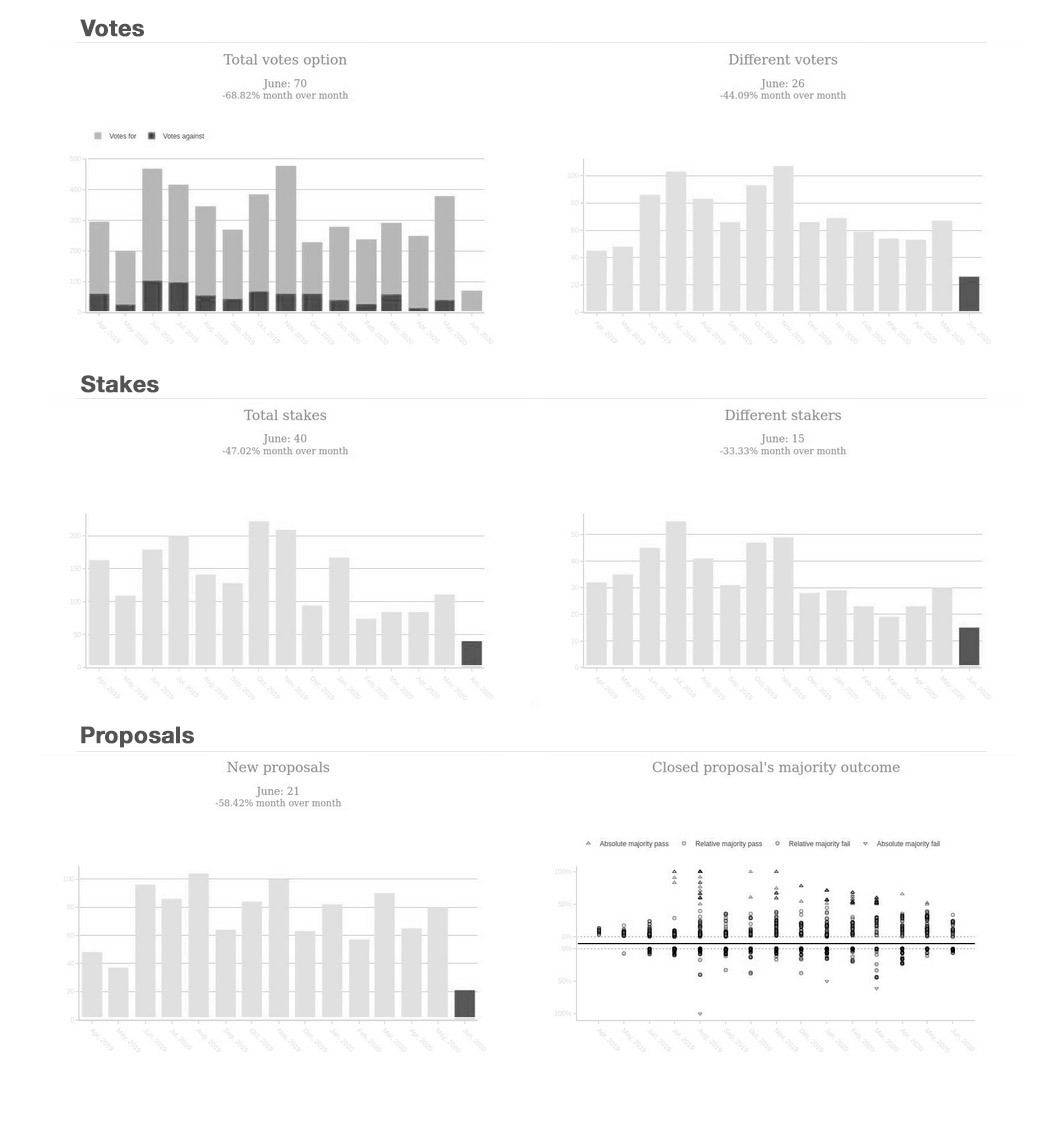
Using DAO-Analyzer to analyze a DAO: The case of Genesis Alpha
Genesis Alpha was a DAOstack DAO that promoted the use of DAOs through DAOstack and the use of the GEN token as a specific tool for decentralized governance. Genesis Alpha received monthly funding of 40,000 USD in cryptocurrencies from DAOstack which were used to fund Genesis DAO proposals to improve or extend the use of DAOstack as a DAO platform.
Genesis Alpha was launched in April 2019 and was subsequently abandoned in May 2020, as the funds received from DAOstack were interrupted. Our analysis shows Genesis Alpha activity until April 2020 and illustrates one of the common problems of online communities, which is their fragility and how they could easily be abandoned due to a series of circumstances.
Genesis Alpha had 266 registered users, 141 of which registered in the first month. The DAO still registered a regular number of newcomers in subsequent months. However, since December 2019, the number gradually decreased, and no new members registered since March 2020.
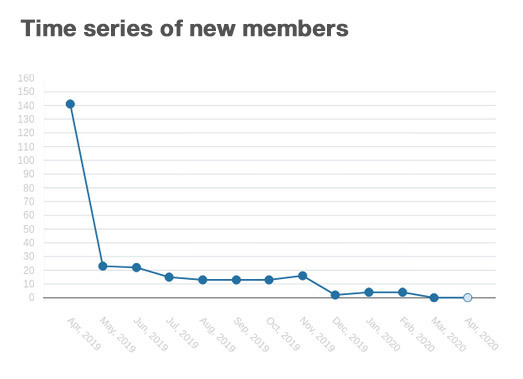
Regarding activity, Genesis Alpha registered over 3,500 actions; it was one the most active DAOs in DAOstack at that time. The activity of GenesisDAO registered a peak in October 2019, but since then it continuously decreased.
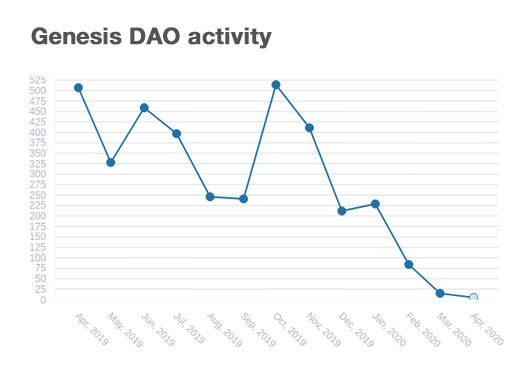
Genesis Alpha had a mean of 53 active users, that is, users that carried out at least one action in a given month. Since October 2019, which saw the peak of active members, the number has decreased. From November 2019, Genesis saw an abrupt decline in activity, having reached its peak only a month before. The sudden change is explained as DAOstack interrupted the funds to GenesisAlpha.
According to some testimonies from Genesis Alpha members, we can conclude that while DAOs are excellent tools for the distribution of funds and for the automatic implementation of decisions (on-chain), in their present form they may have problems with creating social cohesion and ensuring accountability.
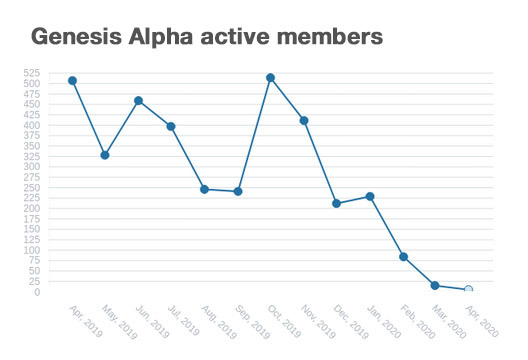
This is but an example of how DAOs can be analyzed with DAO-Analyzer. The tool is free/open source and is publicly available (Github), and we invite contributions. It is deployed at https://dao-analyzer.science for public use. Thus, for instance DAO members can use it to look at the evolution of any DAO. The tool can also be used by social scientists or researchers that seek to understand these new kinds of organizations, or by curious people that want to get into the world of DAOs. We have published several research articles with DAO analysis using DAO-Analyzer, and invite others to do the same.
Note this is a work in progress, and we are working on improving our software. We are now revamping its user interface, and we plan to include new metrics, especially those related with crypto-tokens. However, their inclusion depends on the main DAO platforms APIs. The progressive adoption of our beloved The Graph and making more data available through their APIs are positive steps in the right direction, since they directly affect third-party tools like ours. Keep the good work, and we will be happy to keep ours, to build a thriving open ecosystem.
SHARE
AUTHOR
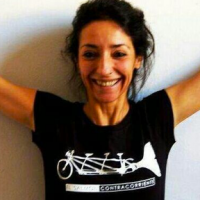
🎓 Original paper by Youssef El Faqir, Javier Arroyo and Samer Hassan
![]() Authorship is by Genoveva López, but this content has been made by the whole P2PModels team
Authorship is by Genoveva López, but this content has been made by the whole P2PModels team ![]()
![]() Images are by Elena Martínez
Images are by Elena Martínez
![]() Copy editing is by Tabitha Whittall
Copy editing is by Tabitha Whittall
![]() Rosa Chamorro and Samer Hassan make everything possible
Rosa Chamorro and Samer Hassan make everything possible





